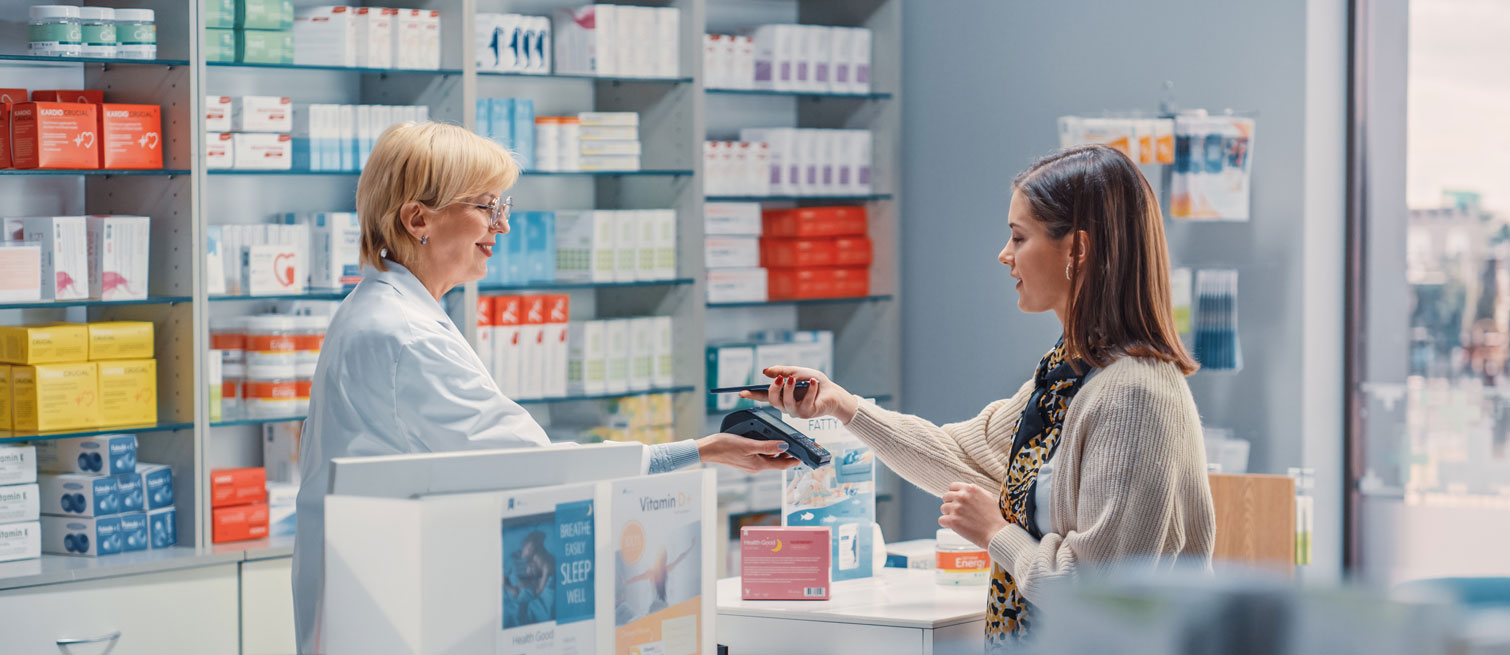
Learn Safe Medication Use for You & Your Loved Ones
Safe Use
Whether you use medications or take care of someone who does, it is important to be aware of guidelines for safe use.
Asking questions is often the first step toward using medication safely. Oftentimes, we may not realize all of the indications, mechanisms, and side effects of the different drugs we take and how they interact with one another. It is essential to talk to your doctor or pharmacist to gain a clear understanding of the risks and benefits of what you are taking, why you are taking it, and how it affects your body.
We recommend checking prescriptions, reading labels and patient information, and keeping the lines of communication open with your doctor or pharmacist when caring for yourself or somebody else. In addition, keep medication and supplements up and away from children in the home to prevent accidental ingestion and overdose.
Tips for Using Prescription Medication Safely
- When picking up your prescription from the pharmacy, double check that it is the correct medication and dose.
- Read warnings about any activities to avoid while taking the medication, such as driving, drinking alcohol, eating certain foods, or smoking.
- Store medications out of reach from children to prevent accidental ingestion.
- Communicate with your doctor or pharmacist if you miss a dose or experience any side effects.
- If you are purchasing medication online, look for .pharmacy at the end of the web address or check our list.
Additional Resources:
If you suspect that you or someone you know has overdosed, call 800/222-1222 (American Association of Poison Control Centers) or 911.
Watch our video for a step-by-step guide on understanding prescription labels.
Tips for Using Over-The-Counter (OTC) Medication Safely
- Examine the package before you buy it to make sure it has not been tampered with.
- Read the drug product’s label for proper usage and safety information. Learn more about how to read drug fact labels.
- Read all warnings and precisely follow all instructions for use, including using the measurement tools that come with the medicine.
- Avoid taking 2 or more medications containing acetaminophen at the same time, as this may increase the risk of overdose and liver damage. You can test your knowledge of acetaminophen dosing at knowyourdose.org.
- Report OTC medications and supplements you take to your provider, along with your prescriptions.
- Taking more than the recommended acetaminophen dose may lead to serious health risks. Stay within safe limits by using the Acetaminophen Dosing Calculator to avoid exceeding the daily limit.
Decoding OTC Medication Labels
Reading an OTC Drug Label: The Key to Proper Medicine Use
The label tells you what a medicine is supposed to do, who should or should not take it, and how to use it. It is your responsibility to be informed and to use OTC drug products wisely and responsibly by reading and following the information provided.
The manufacturers of OTC medicines sometimes make changes to their products or labeling (new ingredients, dosages, or warnings). Make sure to read the label each time you use the product. Always look for special “flags” or “banners” on the front product label alerting you to such changes. If you read the label and have any questions, contact your doctor, pharmacist, or other health care professional.
The information on an OTC label includes more than just the usage instructions. All over-the-counter (OTC) medicine labels provide detailed usage and warning information, offering you the knowledge to make informed decisions about your health. The following elements can be found on OTC labels:
- Active Ingredient: The therapeutic substance in the product, indicating the amount per unit.
- Purpose: Defines the product’s action or category (e.g., antihistamine, antacid).
- Uses: Outlines the symptoms or diseases the product treats or prevents.
- Warnings: Crucial information on when not to use the product, potential interactions or side effects, and conditions requiring professional advice from a health care provider.
- Directions: Specifics on the medication based on age categories, dosage, administration, frequency, and duration.
- Inactive Ingredients: Substances included in the medication such as colors or flavors.
- Other Information: Storage guidelines and details about specific ingredients.
Safe Medication Management
In the intricate landscape of managing multiple medications, ensuring safety and effectiveness is paramount. With over 20% of US adults aged 40 and older taking 5 or more prescription drugs, a proactive and informed approach is crucial.
Understand Your Medication Routine
Effectively managing prescriptions goes beyond adhering to a schedule. To navigate the complexities:
- Engage with your pharmacist to confirm precise doses and timings.
- Regularly verify information, especially when starting a new prescription.
- Incorporate your medication schedule into daily routines, using reminders or timers for consistency.
Use a Pill Organizer
Streamlining your medication routine can be easier by using a pill organizer:
- Opt for a weekly or daily organizer, especially if you are managing several medicines.
- Keep the original containers for your medications not in the organizer to readily access vital information.
Communicate with Your Providers is Key
Ensure your health care providers are well-informed about your current medications:
- Maintain an up-to-date list of all medications, including the dosage. A medicine wallet card can be a helpful way to organize this information.
- Share your comprehensive medication list with every clinician, regardless of the medical condition.
- Consider centralizing prescription refills through 1 pharmacy for cohesive records.
In addition to communicating current medications, you should maintain an open dialogue with your providers.
- Communicate your allergies to physicians, clinicians, and pharmacists for accurate records.
- Talk to your health care provider before altering your medication regimen.
- Review your medications annually with your health care provider to make sure your medications align with your current health.
Safeguard Your Medication
Ensuring the safety and effectiveness of your medication involves thoughtful practices:
- Properly store medications in a cool, dry place, avoiding bathrooms due to wide temperature changes.
- Store medicines in childproof locations, especially those without childproof safety measures.
- Take medications in well-lit surroundings, ensuring your focus, to minimize the risk of errors.
- Never take someone else’s prescription or give someone else your prescription medication.
- Promptly dispose of discontinued, unneeded, or expired medications.
Preventing Medication Errors
With thousands of prescription and OTC medications, as well as supplements on the market, recognizing the possible signs of a medication error and what to do if you are suspicious of one can help increase safety for you and others. Medication errors can occur if a prescription is misread when it is entered into the system, when a medication is being prepared, or when a medication is taken. Staying in contact with your health care provider or pharmacist can help you to avoid medication errors.
You can help to keep you and your family safe by
- asking questions about dosage,
- understanding label or instructions,
- avoiding potential drug interactions, and
- identifying any suspicious medications you receive.
How to Report Medication Errors
By reporting medication errors, suspicious medication, and adverse reactions, you can help ensure the safety of yourself and others in addition to preventing future errors. Reports are used to investigate incidents, create awareness, or even adjust protocols. Access one of these resources to submit a report:
- Report any suspicious medical product or adverse drug reactions or events through Food and Drug Administration’s (FDA) MedWatch program. You can also find FDA safety alerts about medications, food, and more.
- Health care practitioners and consumers can report medication and vaccine errors to Institute for Safe Medicine Practices (ISMP) to help reduce patient harm and prevent future errors.
Tips for Caregivers
If you are caring for another person, there are some concrete steps you can take to ensure safe medication use.
- Ask for and read the medication information sheet for any new drugs.
- Make a list of all prescription, non-prescription, and herbal medications or supplements being taken and share this with their doctor and pharmacist. Ask their doctor or pharmacist to review their medication list once a year. Find tips to create a keep a medication list on FDA’s website.
- Use a labeled pill box or calendar to remember when each medication should be taken. Keep pill boxes out of reach of children.
- Consider asking for large-print labels on pill bottles if the patient has trouble reading small print.
- Make sure to follow through with appointments for tests and follow-up care. This will ensure that the treatment is working properly and any concerns are being addressed.


How Your Pharmacist Can Help You
Your pharmacist can assist in many aspects of health care. When you visit the pharmacy, you can ask them to help you:
- Manage your medications
- Use opioids safely
- Find an over-the-counter medication
- Save money on medication
- Get vaccinated